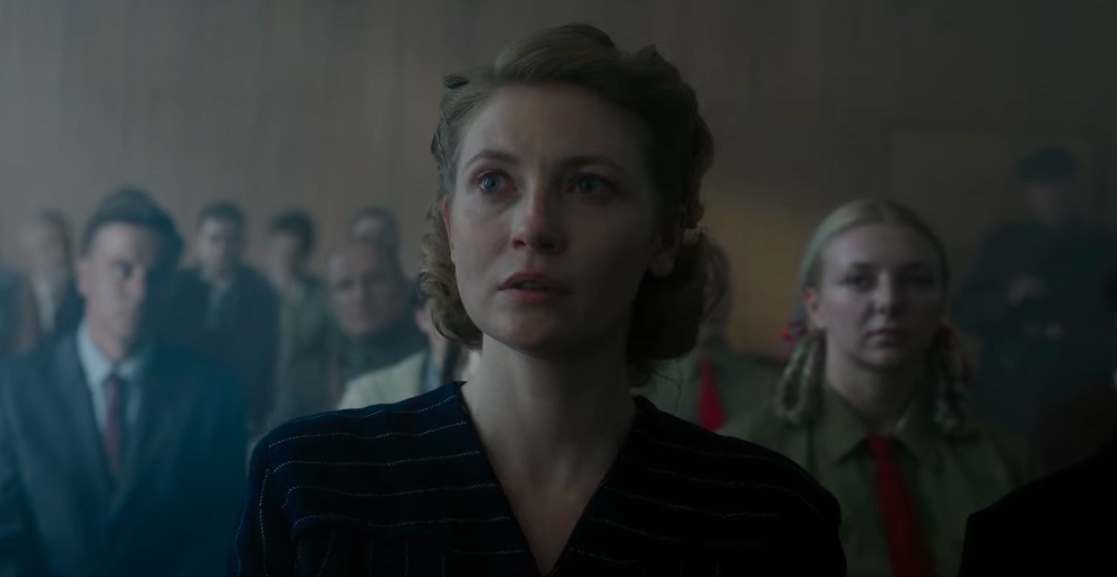Netflix’s ‘Pilecki’s Report’ focuses on the events surrounding the arrest, torture, and eventual execution of Witold Pilecki, a Polish war hero who gave his life to serving his country and saving lives. Despite his decorated past, Pilecki suffered a brutal end at the hands of the communist regime that had taken over the country following the Second World War. While he was imprisoned, his wife tried her best to get him out of there. But what became of her following his death?
Maria Pilecka Lived a Long Life
Maria Pilecka died at the age of 96 on February 6, 2002, in Warsaw, Poland. She is laid to rest at the Powązki Cemetery in the Pantheon of Fighting Poland, next to the symbolic grave of her husband, whose remains haven’t been found yet.
Born in 1906 in Ostrów Mazowiecka, Poland, Maria was one of the six children of Konstanty Ostrowski and Franciszka Krawczyk-Ostrowska. Maria had been a sharp girl since the beginning, and when she grew up, she took to teaching. After finishing a two-year course in teaching, she left home and moved in with her sister, Wiktoria, and her family in Wołkowysk. Her brother-in-law, who was also in the teaching profession, helped her get her first job in a public school in Bieniakonie, Nowogródek County. Later, she moved to Krupa, where she taught seventh-grade students.
#OTD 20 May 1906, Maria Pilecka, the wife of Witold #Pilecki was born in Ostrów Mazowiecka. She was a teacher. After her husband was arrested, she put a lot of effort into trying to have him released – sadly, to no avail. She worked at the Society of Friends of Street Children. pic.twitter.com/r7Y9P1csbz
— Instytut Pileckiego (@InstPileckiego) May 20, 2021
Maria met Witold Pilecki in 1929 while visiting the estate of her friend, who was a neighbor of Pilecki’s estate. Pilecki tried everything to win her heart, including throwing bouquets of her favorite flowers through her room’s window while riding a horse. The courtship soon turned into marriage, and the couple was wed on April 7, 1931. They had their first child, Andrzej, in 1932 and their daughter, Zofia, in 1933. In 1939, when war came knocking, Pilecki left to serve in the Polish Army. The Pilecki family had been living in Suzdrowie, but they moved to Ostrów Mazowiecka after the war started to stay safe. They eventually moved to Warsaw to be closer to Pilecki, though he was often occupied because of his duties. The family were last together on the Christmas of 1946, following which Pilecki was arrested and never returned home.
7 kwietnia 1931 roku w Ostrowi Mazowieckiej pobrali się Witold Pilecki i Maria Ostrowska. 💍🤵👰
Na zdjęciu Pileccy w Legionowie, rok 1944.
Koloryzacja: @KolorHistorii pic.twitter.com/g3liBr4oSv— Instytut Pileckiego (@InstPileckiego) April 7, 2024
Maria tried everything, including talking to the Prime Minister, to have her husband freed. She would carry parcels for him every month during his confinement, and they only got to meet between the hearings of his trial. However, she was not present at the trial itself and found out about the verdict like the rest of the country: through the radio. She tried to get clemency for her husband and tried to reach out to anyone who could help, but nothing worked. One day, when she arrived at the prison with a parcel for her husband, she was told that they couldn’t accept it because he was gone. At first, Maria thought that Pilecki may have been moved to a Siberian prison, but later, she discovered that he had been executed.
Maria and Her Children Led a Difficult Life After Pilecki’s Death
The trial tainted Pilecki’s image for the next few decades, and his family had to bear the brunt of it. Following his death, it became impossible for Maria to find a job to keep her family afloat. Her husband was labeled a “traitor to the homeland,” and no one was willing to employ a traitor’s wife. Due to this, Maria had to make do with whatever job came her way, including tea maker and cleaner. She worked several jobs at a time to support her family, which included working at the therapeutic colonies of the Boarding Houses and Scholarships Society in Busko and working at the State Personnel Training Center of the Ministry of Foreign Trade in Miedzeszyn.
17 lat temu zmarła Maria Pilecka, żona Witolda Pileckiego.
Z wykształcenia była nauczycielką. Za Witolda wyszła 7 kwietnia 1931 r. po ślubie zamieszkali w majątku w Sukurczach. W czasie II wojny światowej Maria wraz z dziećmi wyjechała do domu matki w Ostrowi. pic.twitter.com/GjiugH2two
— Instytut Pileckiego (@InstPileckiego) February 6, 2019
In 1951, she joined the Society of Friends of Street Children via her brother-in-law and continued working there till her retirement. Her job was in the administrative and financial departments. Her work also included setting up camps in Świder and Gdynia while working at the already-established camps in Warsaw, Praga, and Muranów. She was loved by the children she taught and was held in high regard by her co-workers.
It was after the fall of communism and Poland’s move towards democracy that the stain on Pilecki’s reputation was cleaned up, and he was recognized as the national hero he was. In 1990, the government awarded compensation of PLN 50,000 ($12.7k, according to current value) to Maria and her children as reparations for the injustice done to Pilecki and the loss of support that his family faced in his absence. In 2016, Maria was posthumously awarded Honorary Citizenship of the City of Ostrów Mazowiecka.
Read More: Best Army and War Shows on Netflix

